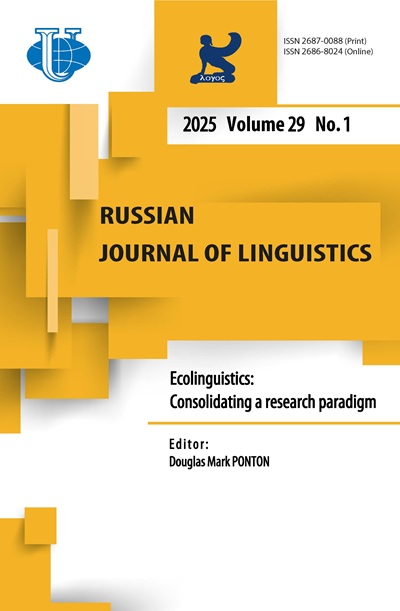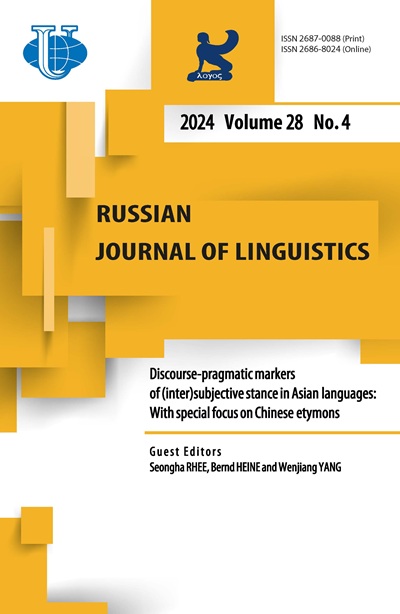Дискурсивно-прагматические маркеры (интер)субъективной позиции в азиатских языках
- Авторы: Хайне Б.1, Ян В.2, Ри С.3,4
-
Учреждения:
- Кельнский университет
- Университет Макао
- Университет Махидол
- Университет иностранных исследований Ханкук
- Выпуск: Том 28, № 4 (2024): Discourse-pragmatic markers of (inter)subjective stance in Asian languages: With special focus on Chinese etymons
- Страницы: 751-770
- Раздел: Статьи
- URL: https://journals.rudn.ru/linguistics/article/view/42173
- DOI: https://doi.org/10.22363/2687-0088-40718
- EDN: https://elibrary.ru/KUPEAE
Цитировать
Полный текст
Аннотация
Этот специальный выпуск посвящен языкам, принадлежащим к синосфере - региону, в котором Китай играл важную геополитическую и культурную роль. Его цель - проследить ареальные последствия влияния китайского языка на языки региона на протяжении веков. В выпуске рассматривается ряд слов китайского происхождения, употребляемых в японском, корейском, вьетнамском и тайском языках, а также их изменения. Исследуются теоретически значимые вопросы, связанные с языковыми контактами, дискурсивно-прагматическими аспектами изменения языка и влиянием социокультурных факторов на развитие языка. Данные процессы показаны на примере развития дискурсивных маркеров из более ранних лексических единиц китайского происхождения. Девять статей, представленных в этом специальном выпуске, имеют ряд общих черт. Во-первых, они так или иначе имеют дело с ареальным влиянием, которое китайский язык оказывал на эти языки на протяжении веков. Во-вторых, их целью является лингвистическая реконструкция и сопоставление современных моделей использования языка с более ранними стадиями их использования. В-третьих, лингвистическая реконструкция ограничивается только тем языковым материалом, на котором возникли и развились новые модели организации дискурса. В-четвертых, наиболее часто используемым инструментом для осуществления реконструкций является теория грамматикализации. И, наконец, основное внимание авторов этого специального выпуска уделяется роли дискурсивных маркеров в развитии языка. Ими ставится задача проследить, как они возникли, как развивались и как функционируют сегодня. Этот специальный выпуск демонстрирует, что языки, рассматриваемые в нем, находились под значительным влиянием китайского языка через письменные тексты.
Ключевые слова
Об авторах
Бернд Хайне
Кельнский университет
Автор, ответственный за переписку.
Email: bernd.heine@uni-koeln.de
ORCID iD: 0000-0002-9304-7814
почетный профессор Института африканских исследований Кельнского университета, Германия. Работал в качестве приглашенного профессора в Европе, Восточной Азии, Австралии, Африке, Северной Америке и Южной Америке. Его исследовательские интересы включают африканские языки, теорию грамматикализации, лингвистическую типологию, языковые контакты и интерактивную грамматику. Является автором и соавтором многих книг, последние из которых The Rise of Discourse Markers (Cambridge University Press, 2021) и The Grammar of Interactives (Oxford University Press, 2023).
Кельн, ГерманияВэньцзян Ян
Университет Макао
Email: wenjiangyang@um.edu.mo
ORCID iD: 0009-0000-1802-0630
доцент кафедры японской лингвистики в Университете Макао, Макао, Китай. Получил степень PhD по японской лингвистике в Пекинском университете, Китай, в 2014 году. Его исследовательские интересы включают морфологию, синтаксис, семантику, историческую лингвистику и контрастивную лингвистику с особым акцентом на времени, аспекте, эвиденциальности и дискурсивных маркерах в современном японском языке, а также в их диахронической эволюции.
Макао САР, КитайСанха Ри
Университет Махидол; Университет иностранных исследований Ханкук
Email: srhee@hufs.ac.kr
ORCID iD: 0000-0003-0312-0975
профессор лингвистики в Университете Махидол, Тайланд, и почетный профессор в Ханкукском университете иностранных исследований, Корея. Получил степень PhD по лингвистике в Техасском университете в Остине в 1996 году. Сфера его научных интересов - выявление когнитивных и дискурсивных механизмов изменения языка в межъязыковой и типологической перспективе. Автор книги World Lexicon of Grammaticalization (Cambridge University Press, 2019), глав в книгах The Cambridge Handbook of Korean Linguistics (2022) и научных статей в журналах Nature, Journal of Pragmatics, Language Sciences, Russian Journal of Linguistics, Lingua и др.
Накхонпатхом, Тайланд; Сеул, Республика КореяСписок литературы
- Adachi, Mayumi. 2024. From truth to discourse marker: The case of thật in Vietnamese. Russian Journal of Linguistics 28 (4). 966-990. https://doi.org/10.22363/2687-0088-40501
- Alves, Mark J. 2001. What’s so Chinese about Vietnamese? In Graham W. Thurgood (ed.), Papers from the ninth annual meeting of the Southeast Asian linguistics society, 221-242. Tempe, AZ: Arizona State University, Program for Southeast Asian Studies.
- Alves, Mark J. 2007. Categories of grammatical Sino-Vietnamese vocabulary. Mon-Khmer Studies 37. 217-229.
- Alves, Mark J. 2009. Loanwords in Vietnamese. In Martin Haspelmath & Uri Tadmor (eds.), Loanwords in the world’s languages: A comparative handbook, 617-637. Berlin: Mouton de Gruyter.
- Barðdal, Jóhanna, Elena Smirnova, Lotte Sommerer & Spike Gildea (eds.). 2015. Diachronic Construction Grammar. Amsterdam, Philadelphia: John Benjamins.
- Beeching, Kate & Ulrich Detges (eds.). 2014. Discourse Functions at the Left and the Right Periphery: Crosslinguistic Investigations of Language Use and Language Change. Leiden, Boston: Brill.
- Brinton, Laurel J. 2017. The Evolution of Pragmatic Markers: Pathways of Change. Cambridge: Cambridge University Press.
- Brinton, Laurel J. 2024. The rise of what-general extenders in English. Journal of Historical Pragmatics 25 (1). 104-136.
- Brinton, Laurel J. & Reijirou Shibasaki. (forhcoming). “No matter what, you must think positive”: The development of no matter (what) as a pragmatic marker. Manuscript, Meiji University, Tokyo.
- Beeching, Kate, Chiara Ghezzi & Piera Molinelli. 2018. Positioning the Self and Others: Linguistic Traces. Amsterdam, Philadelphia: Benjamins.
- Clyne, Michael. 2003. Dynamics of Language Contact: English and Immigrant Languages. Cambridge: Cambridge University Press.
- Dér, Csilla Ilona. 2010. On the status of discourse markers. Acta Linguistica Hungarica 57 (1). 3-28.
- Dér, Csilla Ilona & Alexandra Markó. 2010. A pilot study of Hungarian discourse markers. Language and Speech 53 (2). 135-180.
- Detges, Ulrich & Richard Waltereit. 2014. Moi je ne sais pas vs. Je ne sais pas moi: French disjoint pronouns in the left vs. right periphery. In Kate Beeching & Ulrich Detges (eds.), Discourse functions at the Left and the Right periphery: Crosslinguistic investigations of language use and language changem, 24-46. Leiden: Brill.
- Du Bois, John W. 2007. The stance triangle. In Robert Englebretson (ed.), Stancetaking in discourse: Subjectivity, evaluation, interaction, 139-182. Amsterdam: John Benjamins.
- Englebretson, Robert. 2007. Stancetaking in discourse: An introduction. In Robert Englebretson (ed.), Stancetaking in discourse: Subjectivity, evaluation, interaction, 1-25. Amsterdam: John Benjamins.
- Furkó, Bálint Péter. 2014. Cooptation over grammaticalization. Argumentum 10. 289-300.
- Grant, Anthony P. 2012. Contact, convergence, and conjunctions: A cross-linguistic study of borrowing correlations among certain kinds of discourse, phasal adverbial, and dependent clause markers. In Claudine Chamoreau & Isabelle Léglise (eds.), Cross-linguistic tendencies in contact-induced change: A typological approach based on morphosyntactic studies, 311-58. Berlin: Mouton de Gruyter.
- Haarmann, Harald. 2012[1986]. Language in Ethnicity: A View of Basic Ecological Relations. Berlin: De Gruyter Mouton.
- Heine, Bernd. 2002. On the role of context in grammaticalization. In Ilse Wischer & Gabriele Diewald (eds.), New reflections on grammaticalization, 83-101. Amsterdam, Philadelphia: Benjamins.
- Heine, Bernd. 2023. The Grammar of Interactives. Oxford: Oxford University Press.
- Heine, Bernd, Gunther Kaltenböck, Tania Kuteva & Haiping Long. 2013. An outline of discourse grammar. In Shannon Bischoff & Carmen Jany (eds.), Functional approaches to language, 175-233. Berlin : Mouton de Gruyter.
- Heine, Bernd, Gunther Kaltenböck, Tania Kuteva & Haiping Long. 2017. Cooptation as a discourse strategy. Linguistics 55 (4). 813-55.
- Heine, Bernd, Gunther Kaltenböck, Tania Kuteva & Haiping Long. 2021. The Rise of Discourse Markers. Cambridge: Cambridge University Press.
- Heine, Bernd & Tania Kuteva. 2005. Language Contact and Grammatical Change. Cambridge: Cambridge University Press.
- Heine, Bernd & Tania Kuteva. 2007. The Genesis of Grammar: A Reconstruction. Oxford: Oxford University Press.
- Heine, Bernd & Haiping Long. 2022. Review of Elizabeth Closs Traugott 2022, Discourse structuring markers in English: A historical constructionalist perspective on pragmatics. Functions of Language 29 (3). 338-343.
- Higashiizumi, Yuko, Reijirou Shibasaki & Keiko Takahashi. 2024. From truth to truly: The case of shinni ‘truly’ in Japanese compared to Chinese, Korean, and Thai counterparts. Russian Journal of Linguistics 28 (4). 843-864. https://doi.org/10.22363/2687-0088-40518
- Higashiizumi, Yuko & Reijirou Shibasaki (eds.). (In preparation). The Emergence of Pragmatic Markers from Chinese Compounds in Chinese, Japanese, and Korean: Perspectives from East Asian Languages and Beyond. Leiden: Brill.
- Hilpert, Martin. 2013. Constructional Change in English: Developments in Allomorphy, Word-Formation, and Syntax. Cambridge: Cambridge University Press.
- Hopper, Paul J. 1991. On some principles of grammaticization. In Elizabeth Closs Traugott & Bernd Heine (eds.), Approaches to grammaticalization, Volume 1, 17-35. Amsterdam, Philadelphia: Benjamins.
- Hyland, Ken. 1998. Persuasion and context: The pragmatics of academic metadiscourse. Journal of Pragmatics 30. 437-455.
- Irwin, Mark & Matthew Zisk. 2019. Japanese Linguistics. (The Japanese Language I). Tokyo: Asakura Publishing.
- Jucker, Andreas. 2002. Discourse markers in Early Modern English. In Richard Watts & Peter Trudgill (eds.), Alternative histories of English, 210-230. London: Routledge.
- Kaltenböck, Gunther, Bernd Heine &Tania Kuteva. 2011. On thetical grammar. Studies in Language 35 (4). 848-893.
- Khammee, Kultida. 2024. From objective to subjective and to intersubjective functions: The case of the Thai ‘truth’-lexeme. Russian Journal of Linguistics 28 (4). 942-965. https://doi.org/10.22363/2687-0088-40496
- Kulke, Hermann & Dietmar Rothermund. 2004. A History of India. Fourth edition. New York: Routledge.
- Lee, Hyun Sook. 2024. From a noun to a discourse marker: The case of seysang ‘world’ in Korean. Russian Journal of Linguistics 28 (4). 891-915. https://doi.org/10.22363/2687-0088-40499
- Lehmann, Christian. 2015[1982]. Thoughts on Grammaticalization. Third edition. Berlin: Language Science Press.
- Long, Haiping & Lei Wang. 2024. Speaker-orientation meaning and positional shift of discourse structuring markers. Russian Journal of Linguistics 28 (4). 794-817. https://doi.org/10.22363/2687-0088-40605
- Matras, Yaron. 1998. Utterance modifiers and universals of grammatical borrowing. Linguistics 36. 281-331.
- Matras, Yaron & Jeanette Sakel. 2007. Investigating the mechanisms of pattern replication in language convergence. Studies in Language 31 (4). 829-865.
- Narrog, Heiko & Bernd Heine. 2021. Grammaticalization. Oxford: Oxford University Press.
- Narrog, Heiko, Seongha Rhee & John Whitman. 2018. Grammaticalization in Japanese and Korean. In Heiko Narrog & Bernd Heine (eds.), Grammaticalization from a typological perspective, 166-188. Oxford: Oxford University Press.
- Nguyễn, Đình Hòa. 1961. The Vietnamese Language. Vietnam Culture Series, no. 2. Saigon: Department of National Education.
- Norman, Jerry. 1988. Chinese. Cambridge: Cambridge University Press.
- Overstreet, Maryann & George Yule. 2021. General Extenders: The Forms and Functions of a New Linguistic Category. Cambridge: Cambridge University Press.
- Park, Jiyeon. 2024. The evolution of pragmatic marker zenzen in Japanese: From objectivity to intersubjectivity. Russian Journal of Linguistics 28 (4). 865-890. https://doi.org/10.22363/2687-0088-40516
- Pons Bordería, Salvador. 2018. Paths of grammaticalization: Beyond the LP/RP debate. In Salvador Pons Bordería & Óscar Loureda Lamas (eds.), Beyond grammaticalization and discourse markers, 334-383. Leiden, Boston: Brill.
- Rhee, Seongha. 2013. “I know I’m shameless to say this”: Grammaticalization of the mitigating discourse marker makilay in Korean. Procedia: Social and Behavioral Sciences 97. 480-486.
- Rhee, Seongha, Reijirou Shibasaki & Xinren Chen (eds.). 2021. Grammaticalization of discourse markers in East Asian Languages. East Asian Pragmatics 6 (3). [Special issue].
- Rhee, Seongha & Lin Zhang. 2024. The way of truth: The case of the Korean discourse marker cincca in comparison with Chinese zhenshi and zhende. Russian Journal of Linguistics 28 (4). 818-842. https://doi.org/10.22363/2687-0088-40500
- Schiffrin, Deborah. 1987. Discourse Markers. Cambridge: Cambridge University Press.
- Shibasaki, Reijirou & Yuko Higashiizumi. (In preparation). An introduction. In Yuko Higashiizumi & Reijirou Shibasaki (eds.), The emergence of pragmatic markers from Chinese compounds in Chinese, Japanese, and Korean: Perspectives from East Asian languages and beyond. Leiden: Brill.
- Shibatani, Masayoshi. 1990. The Languages of Japan. Cambridge: Cambridge University Press.
- Sohn, Ho-min. 2001[1999]. The Korean Language. Cambridge: Cambridge University Press.
- Traugott, Elizabeth Closs. 1982. From propositional to textual and expressive meanings: Some semantic-pragmatic aspects of grammaticalization. In Winfred P. Lehmann & Yakov Malkiel (eds.), Directions for Historical linguistics: A symposium, 245-271. Austin: University of Texas Press.
- Traugott, Elizabeth Closs. 1995. The role of the development of discourse markers in a theory of grammaticalization. Paper presented at the International Conference of Historical Linguistics XII, Manchester 1995.
- Traugott, Elizabeth C. 2018. Modeling language change with constructional networks. In Salvador Pons Bordería & Óscar Loureda Lamas (eds.), Beyond grammaticalization and discourse markers: New issues in the study of language change, 17-50. Leiden: Brill.
- Traugott, Elizabeth Closs. 2022. Discourse Structuring Markers in English: A Historical Constructionalist Perspective on Pragmatics. Amsterdam, Philadelphia: Benjamins.
- Traugott, Elizabeth Closs & Graeme Trousdale. 2013. Constructionalization and Constructional Changes. Oxford: Oxford University Press.
- Yae, Sunhee. 2024. From ‘one morning’ to a discourse marker: The case of iltan in Korean. Russian Journal of Linguistics 28 (4). 916-941. https://doi.org/10.22363/2687-0088-40602
- Yang, Wenjiang. 2024. From temporal adverbials to discourse markers: The development of Chinese yuánlái and its Japanese cognate ganrai. Russian Journal of Linguistics 28 (4). 771-793. https://doi.org/10.22363/2687-0088-40514

















